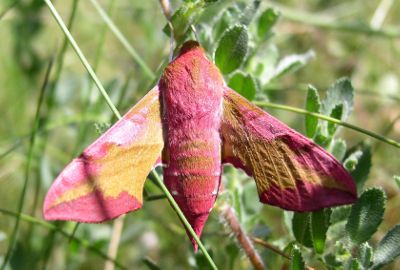Grand sphinx de la vigne : Différence entre versions
m (A déprotégé « Grand sphinx de la vigne ») |
|||
| (5 révisions intermédiaires par le même utilisateur non affichées) | |||
| Ligne 3 : | Ligne 3 : | ||
[[Image:Grand sphinx de la vigne Gilles BentzBR.JPG|Image:Grand_sphinx_de_la_vigne_Gilles_BentzBR.JPG]]<br> | [[Image:Grand sphinx de la vigne Gilles BentzBR.JPG|Image:Grand_sphinx_de_la_vigne_Gilles_BentzBR.JPG]]<br> | ||
| − | Grand sphinx de la vigne ''Deilephila elpenor'' - photo | + | Grand sphinx de la vigne ''Deilephila elpenor'' - photo © Gilles Bentz LPO |
====== Etymologie ====== | ====== Etymologie ====== | ||
| − | *'''Nom latin''' : ''Deilephila elpenor'' | + | |
| − | *'''Nom anglais''' : | + | *'''Nom latin''' : ''Deilephila elpenor'' |
| − | *'''Famille''' : '''Sphingidae''' | + | *'''Autre nom''' : Grand Pourceau. |
| + | *'''Nom anglais''' : Elephant Hawk-Moth. | ||
| + | *'''Famille''' : '''Sphingidae''' | ||
| + | |||
====== Description ====== | ====== Description ====== | ||
| − | *'''Taille''' : 80 mm (max.) | + | |
| − | * | + | *'''Taille''' : 80 mm (max.) |
| − | ====== Plantes hôtes ====== | + | *Ailes: rose et brun clair. |
| − | *Chenille sur épilobes ''Epilobium'' sp., gaillets ''Galium'' sp., vigne ''Vitis vinifera''. | + | *Thorax : rose et brun clair. |
| + | |||
| + | ====== Plantes hôtes ====== | ||
| + | |||
| + | *Chenille sur épilobes ''Epilobium'' sp., gaillets ''Galium'' sp., vigne ''Vitis vinifera'', ''Fuchsia'' sp. | ||
| + | |||
====== Répartition ====== | ====== Répartition ====== | ||
| − | *Europe, Asie mineure, Asie centrale et Japon. | + | |
| + | *Europe, Asie mineure, Asie centrale et Japon. | ||
*Partout sauf dans les régions les plus septentrionales. | *Partout sauf dans les régions les plus septentrionales. | ||
| + | |||
====== Habitat ====== | ====== Habitat ====== | ||
| + | |||
*Prés, clairières, friches, jardins, bords de cours d'eau. | *Prés, clairières, friches, jardins, bords de cours d'eau. | ||
| − | ====== Ecologie ====== | + | |
| − | *- | + | ====== Ecologie ====== |
| − | ====== Statut ====== | + | |
| + | *'''Période de vol''': mai-août. | ||
| + | |||
| + | ====== Statut ====== | ||
| + | |||
*Pas de statut de protection connu. | *Pas de statut de protection connu. | ||
| − | + | ====== Bibliographie ====== | |
| − | ====== Bibliographie ====== | + | *Bebbington John & Lewington Richard (2007) - '''Guide to the hawkmoths of the British Isles'''. Edition Field Studies Council (FSC). |
| − | *-- | + | *Leraut Patrice (2006) - '''Papillons de nuit d'Europe, bombyx, sphinx, écailles...''' VOL I. NAP éditions. |
| − | *-- | + | *Leraut Patrice (2009) - '''Papillons de nuit d'Europe, géomètres''' VOL II. NAP éditions. |
| − | + | *Lewington Richard (2006) - '''Guide to the day-flying moths of Britain'''. Edition Field Studies Council (FSC) | |
| + | *Manley Chris (2008) - '''British moths and butterflies, a photographic guide'''. Edition A & C Black. | ||
| + | *Robineau Roland (2007) -'''Guide des papillons nocturnes de France''', plus de 1620 espèces décrites et illustrées. Edition Delachaux & Niestlé. | ||
| + | *Skinner Bernard (2009) -'''Colour identification guide to moths of the British isles'''. Edition Apollo Books. | ||
| + | *Townsend M. & Waring P. (2007) -'''Concise guide to the moths of great Britain and Ireland'''. Edition British Wildlife Publishing | ||
| + | *Waring Paul & Townsend Martin (2009)- '''Field guide to the moths of great Britain and Ireland'''. Edition British Wildlife Publishing. | ||
| + | *Young Mark (1997) -'''Natural History of Moths'''. Edition T & AD Poyser Ltd (A & C Black). | ||
Version actuelle datée du 16 septembre 2015 à 15:49
Grand sphinx de la vigne Deilephila elpenor - photo © Gilles Bentz LPO
Sommaire
Etymologie[modifier]
- Nom latin : Deilephila elpenor
- Autre nom : Grand Pourceau.
- Nom anglais : Elephant Hawk-Moth.
- Famille : Sphingidae
Description[modifier]
- Taille : 80 mm (max.)
- Ailes: rose et brun clair.
- Thorax : rose et brun clair.
Plantes hôtes[modifier]
- Chenille sur épilobes Epilobium sp., gaillets Galium sp., vigne Vitis vinifera, Fuchsia sp.
Répartition[modifier]
- Europe, Asie mineure, Asie centrale et Japon.
- Partout sauf dans les régions les plus septentrionales.
Habitat[modifier]
- Prés, clairières, friches, jardins, bords de cours d'eau.
Ecologie[modifier]
- Période de vol: mai-août.
Statut[modifier]
- Pas de statut de protection connu.
Bibliographie[modifier]
- Bebbington John & Lewington Richard (2007) - Guide to the hawkmoths of the British Isles. Edition Field Studies Council (FSC).
- Leraut Patrice (2006) - Papillons de nuit d'Europe, bombyx, sphinx, écailles... VOL I. NAP éditions.
- Leraut Patrice (2009) - Papillons de nuit d'Europe, géomètres VOL II. NAP éditions.
- Lewington Richard (2006) - Guide to the day-flying moths of Britain. Edition Field Studies Council (FSC)
- Manley Chris (2008) - British moths and butterflies, a photographic guide. Edition A & C Black.
- Robineau Roland (2007) -Guide des papillons nocturnes de France, plus de 1620 espèces décrites et illustrées. Edition Delachaux & Niestlé.
- Skinner Bernard (2009) -Colour identification guide to moths of the British isles. Edition Apollo Books.
- Townsend M. & Waring P. (2007) -Concise guide to the moths of great Britain and Ireland. Edition British Wildlife Publishing
- Waring Paul & Townsend Martin (2009)- Field guide to the moths of great Britain and Ireland. Edition British Wildlife Publishing.
- Young Mark (1997) -Natural History of Moths. Edition T & AD Poyser Ltd (A & C Black).
